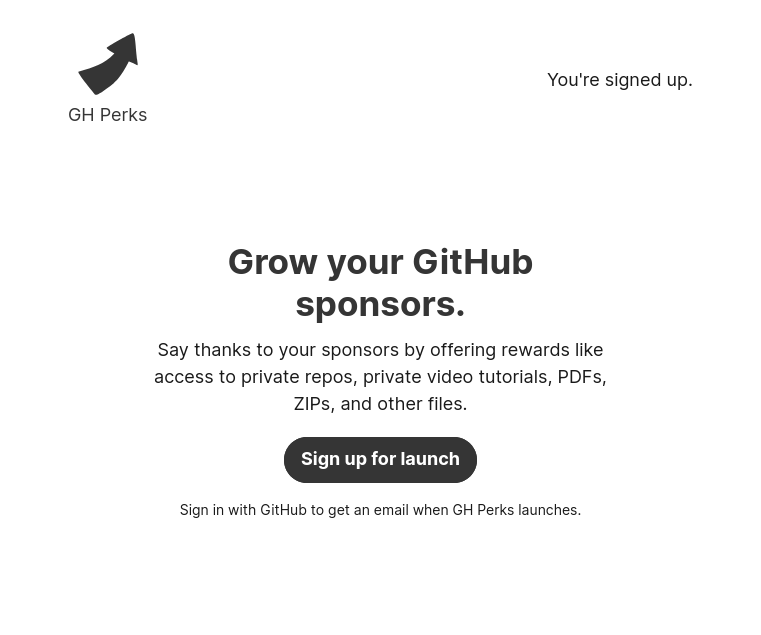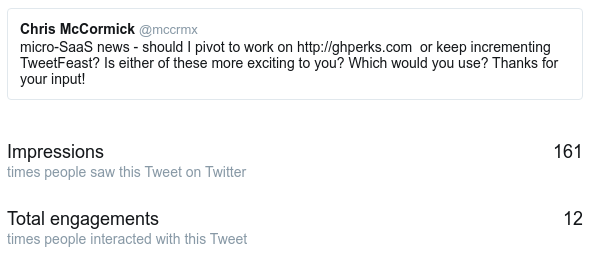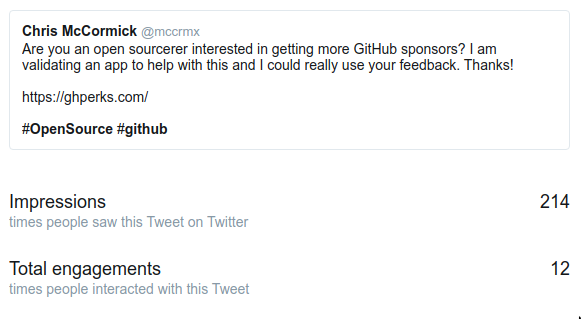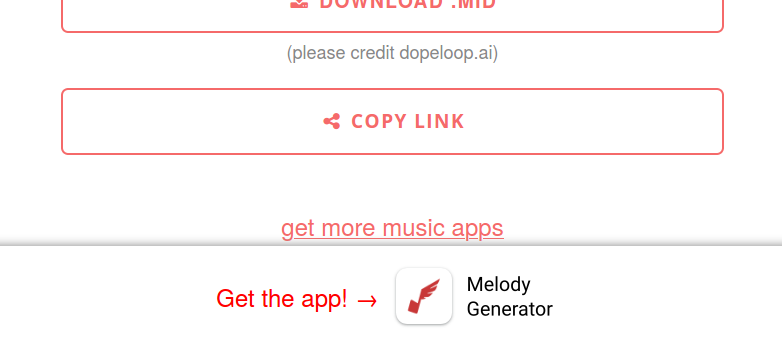Oct. 21, 2021
It's a simple fact that most startup ideas are not going to work out. Just like most tweets never get a retweet, most GitHub projects have no users, and most Hacker News posts never get an upvote. That's the simple truth.
If most ideas are no good the most efficient way to find good ideas is to discard the bad ones as quickly as possible. People talk about "validating" their business ideas by doing market testing, but "validating" has a bias towards a positive outcome. In reality the outcome is usually negative. So don't validate your startup ideas, invalidate them.
I've found it useful to take a scientific attitude. When you have a business hypothesis you need to run experiments to see if your hypothesis matches with reality. In the words of Richard Feynman, "if it disagrees with experiment, it's wrong." Just like Newton poking his eyeballs with knitting needles it helps to be a little detached. Not your retinas though. You'll need those.

This is the story of how I invalidated my greatest ever micro-SaaS idea.
A couple of weeks ago on my morning run, high as a kite on endorphins, I came up with a magnificent idea. I was going to change the world by helping noble open source developers get funded. I'd do this by helping people grow their GitHub sponsors with perks for their sponsors.
I spent the whole day doing some deeper research. There was so much going for this idea. Here is the list of "pros" I wrote down and breathlessly emailed to my entrepreneur friends:
- viral loop (people link to the URL to use it)
- proven concept (existing competitors)
- makes money for people
- creator economy trend
- i personally know the customers
Foolproof. I started fantasizing about what I would say in my Indie Hackers Podcast interview when it hits $10k MRR. How one has to stay humble and wait for the big idea. How one has to work hard and stay focused. How one must listen to the customer you idiots, listen to the god damned customer!!!
The idea was perfect. Except for one thing. Nobody actually wants this software. I know this because I invalidated it.
I set a concrete goal. If I can't convince 100 people to sign up for the launch in 2 weeks then I will give up on the idea. John O'Nolan got 30,000 sign ups from one blog post about his idea before building anything. Surely if my idea is any good I can get 100 signups.
Invalidation #1 - friends
The first thing I did was tell some of my developer friends. Their feedback was interested but luke-warm and skeptical. None of them wanted this product. Nobody said "take my money!"
yeah I like your gh idea too
but unsure if its good or bad
Ok, that's interesting. Maybe it's just my particular developer friends who don't want this? Friends try hard not to hurt or offend you so "your idea is ok" should really be downgraded to "your idea sucks".
I should also note that one of my friends is an open source developer actively taking donations. They should be the target demographic, but they were not very interested.
Invalidation #2 - search
It's always good to check search traffic. Is anybody out there looking for your solution already? You can check Google search volume, Reddit, and Twitter.
For Google search volume I use Ahref's free Keyword Generator tool and also the SurferSEO plugin.
Ahrefs said there are 80 searches for "github sponsors" per month. Not great. SurferSEO said 880 searches per month. That's better, but I trust Ahrefs more. The keyword is also very broad. Searches for more targeted keywords like "how to get github sponsors" were very low.
A Twitter search for "github sponsors" shows there is a lot of chatter. Out of all of the data I collected this Twitter chatter is probably the strongest pro-validation signal.
A Reddit search likewise shows a bit of traffic for people talking about "github sponsors" but the volume was lower than Twitter.
So I built a landing page
I created a simple signup page where people could get notified of the launch by signing in with GitHub. That should get high quality signups from real GitHub users. It could not be easier. All they have to do is click the "sign in with GitHub" button.

I wrote up the idea in the clearest way I could, explaining the benefits. This also allowed me to proof-of-concept the tech stack and GitHub API integration and make sure I could actually deliver the features. You can see the site at GHPerks.com.
Then I started the next round of invalidation testing.
Invalidation #3 - landing page
I posted about the site and the idea in a bunch of places.
- I wrote a tweet asking if I should pivot from my previous micro-SaaS idea to this.

161 impressions. 4 people clicked through. No signups.
- I posted to my local Linux users group mailing list. It has thousands of open source people on it.
1 reply. No signups.
- I posted on Indie Hackers with the title "Looking for devs who want to grow their GitHub sponsors".
33 views. 3 upvotes. No signups.
- I posted a final tweet as I felt like the first one didn't really communicate it well.

214 impressions. 12 people engaged. No signups.
In the end the MVP landing page had hundreds of open source developers visit and nobody signed up to hear about the launch.
This is a big warning sign that nobody wants this product.
Invalidation #4 - competitors
At the start when I first had the idea I did some competitor analysis. Did anybody else have this idea already and was it working for them? People often see competitors as a bad thing, but usually it just means there is a healthy market already where you can offer a differentiated product.
I re-discovered the story of Caleb Porzio who had grown his own GitHub sponsors. I found his MVP of a similar idea https://sponsorsyrup.com and remembered that I actually signed up for this thing.
It made me wonder why he hadn't posted any progress updates. Why had it not launched yet? I had never received any emails about it. I couldn't help thinking, is it because Caleb didn't get the interest he hoped for?
I also discovered https://onlysponsors.dev which is a similar idea. Eduardo has 84 sponsors on GitHub, but are they sponsoring him for this or for his work on Vue.js? From what I can tell there are not many people posting on the site.
This research helped me think about differentiators. What would I do differently? These projects both appear to be closed source but I would stay open source. I would also position it differently from Only Sponsors, and offer different features.
In the end this is an invalidation. Both of these people have huge followings on Twitter and GitHub and they have existing sponsorships. Only one of them has shipped and there doesn't seem to be much activity. With my small audience it would be a lot of work on the marketing and distribution side.
Invalidation #5 - target audience
I contacted some open source developers I know who have substantial sponsorship on GitHub. I even contacted devs who explicitly said they have this problem. There was some interest but not huge, and some strong warning signs:
Dev 1:
Currently I don't have any ideas for "sponsor" only content. I tried this for a while with my videos and secret links, but I gave up on that
When I tried something like this with the videos eventually I felt like I was spending too much time on pleasing sponsors with extra stuff rather than my OSS, so that would be one reason not to go there. When I asked my sponsors about this, most of them said: we are sponsoring for your projects, not for the perks, so you don't have to spend extra time on those perks.
As for special content: I did a few "hidden" videos but eventually I also just wanted to share that with everyone. I guess I'm just bad at keeping things a secret or away from people.
Dev 2:
I have done basically nothing to promote it. probably should be doing more on that front but its mostly organic
no rewards no. can't think of anything useful
Dev 3:
I’ve thought this through a few times and talked to a few other maintainers a while ago. My first impression was: The target group (open source devs) love to build things on their own and they don’t have money to spend. That’s both very tough to deal with. Also, I know some teams failed with similar products (probably for that reason).
This is some great feedback. These people are the exact open source maintainer target audience with existing GitHub sponsors. They are telling me no, we don't want this, and other people have failed at it already. Strong invalidation.
Conclusion: invalidated
The strongest message is the signups. Remember at the start I said I was aiming for 100 signups in two weeks? Only four developers signed up to hear about the launch. Three of them are friends and one is my brother.
My hypothesis was "this idea is so good I will get 100 signups in two weeks". Now I have strong empirical evidence to falsify it.
So this isn't the right app for me to build. It could still be a valuable idea for someone. The right person with a high level of passion and commitment might be able to make it work. Maybe Caleb or Eduardo will succeed with it (and I hope they do).
For me though it is nice to have given the idea a good chance and see it through to invalidation. Running this experiment was fun. Now that I have invalidated it I can skip the pain of building all the features only to discover nobody wants it. I feel very good about that!









